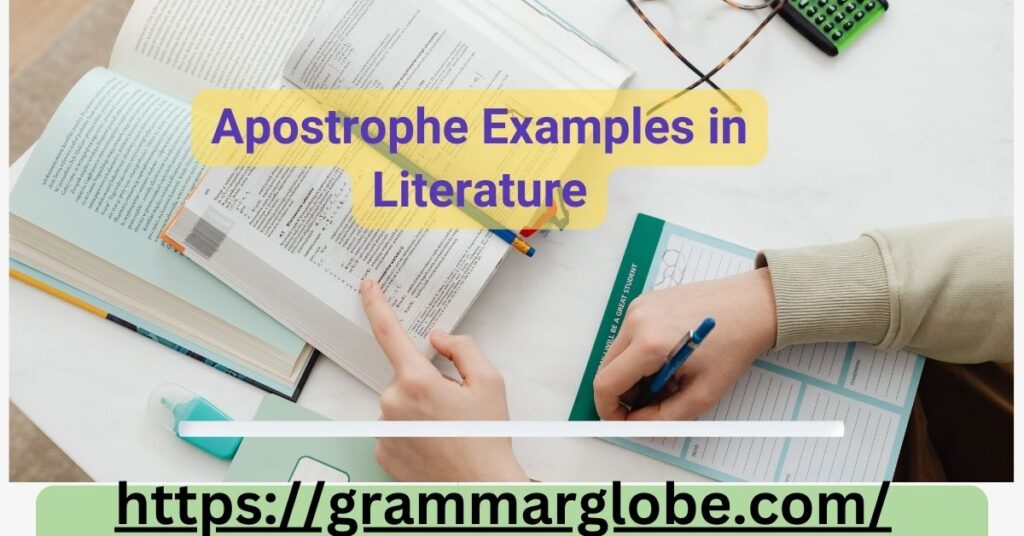In literature, some devices transcend time, weaving threads of emotion, thought, and drama into unforgettable narratives. One such literary device is the apostrophe. Not to be confused with the punctuation mark, an apostrophe in literature is a figure of speech that addresses someone absent, inanimate objects, or abstract entities as though they are present. Apostrophe examples in literature illuminate this device’s ability to connect readers to universal themes like love, mortality, and the passage of time.
This article delves into the purpose, nuances, and memorable examples of the apostrophe as a literary device. From Shakespeare’s soliloquies to modern poetry, let’s explore how apostrophe has been wielded to evoke vivid imagery, express profound emotions, and enhance symbolism.
What Is Apostrophe in Literature?
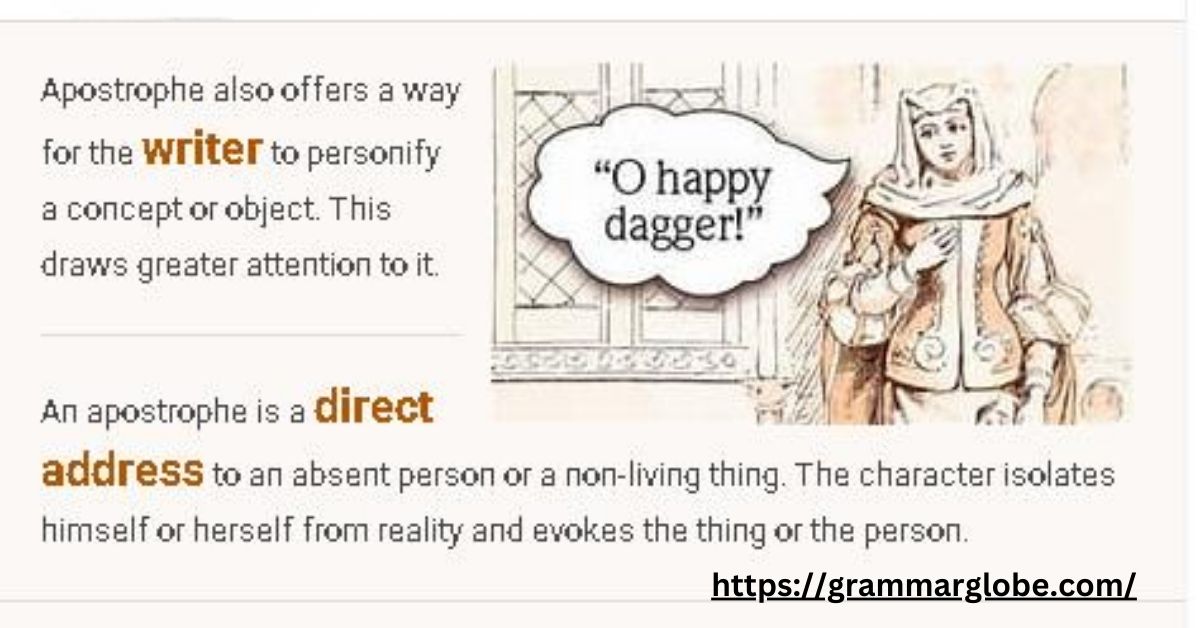
Defining Apostrophe as a Literary Device
The apostrophe is a direct address to someone or something that is not present in the narrative—an abstract concept, an inanimate object, or even an absent person. It allows the speaker to pour out emotions, question fate, or seek solace in solitude.
For example:
- “O Death, where is thy sting?” – The Bible
This rhetorical device distinguishes itself by breaking the fourth wall, inviting readers to experience the speaker’s innermost thoughts and feelings.
Everyday Use of Apostrophe Examples in Literature
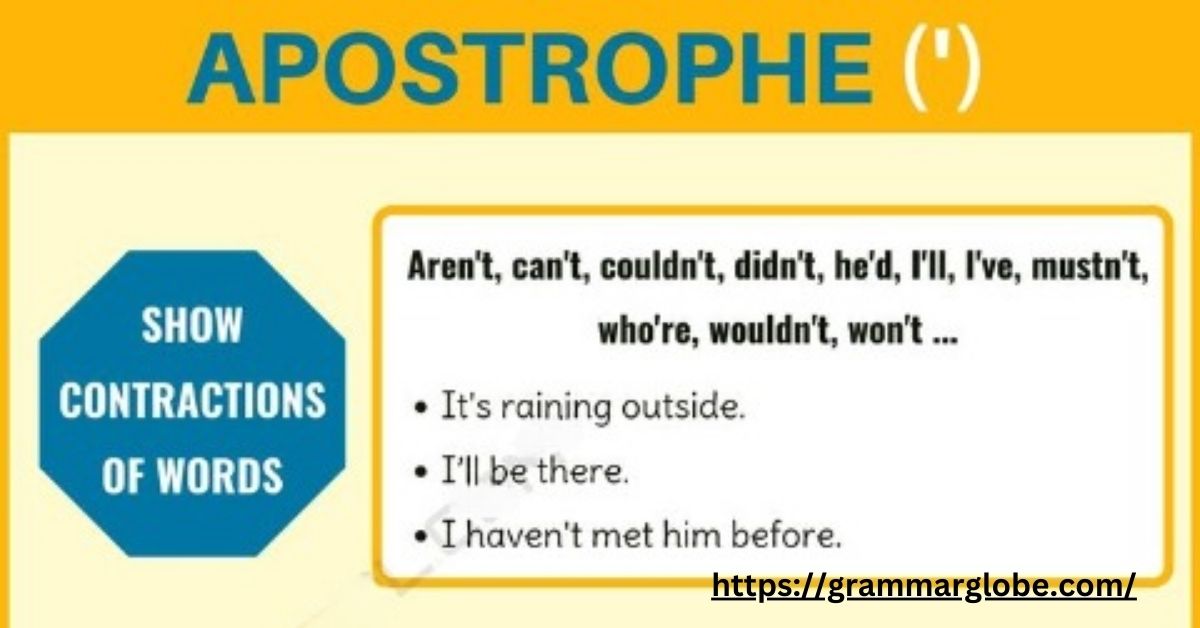
In daily communication, people often use informal apostrophes:
- “Oh, coffee, why can’t you last forever?”
- “Dear diary, today was exhausting.”
These examples highlight the universal human habit of seeking connection through personification and direct address.
Purpose of Apostrophe in Literary Works
Apostrophe serves a multitude of purposes in literature, enhancing the narrative in the following ways:
Emotional Expression Apostrophe Examples in Literature
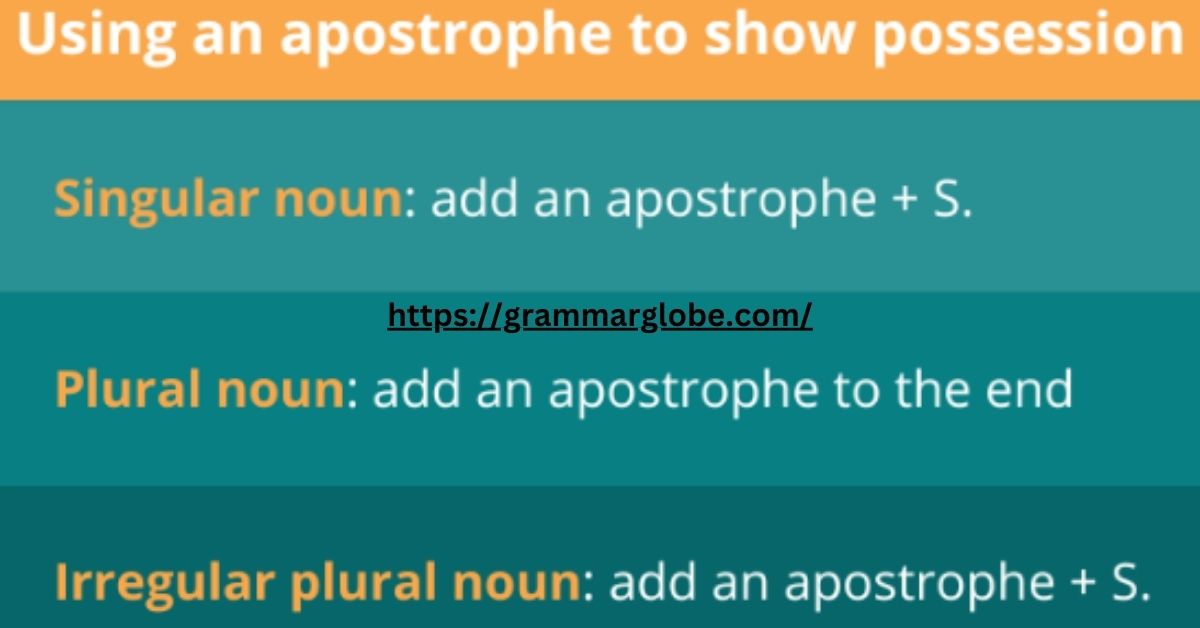
Apostrophe conveys heightened emotions such as:
- Grief: “O my son Absalom! My son, my son Absalom!” – The Bible
- Love: Romantic addresses to lovers in poetry.
- Anger: Appeals to fate or the gods in tragedies.
- Reverence: Addressing nature or divine forces.
- A grieving mother cries out, “Oh, my sweet child, why did you leave me so soon?”
- A poet exclaims, “O moon, guide me through this dark night of despair.”
- A character shouts, “Fate, why have you forsaken me in my time of need?”
- A lover whispers, “O stars, keep her safe while she sleeps far away.”
- An old man prays, “Oh, youth, where have you gone?”
- A writer sighs, “O inspiration, return to me and fill my empty page.”
- A soldier laments, “O comrades, I miss your laughter in these silent nights.”
- A widow sobs, “Oh, my dearest love, your absence is a wound that never heals.”
- A philosopher muses, “O truth, why are you so elusive?”
- A musician pleads, “O muse, bless me with a melody worthy of my sorrow.”
- A painter declares, “Oh, colors of the sunset, how you soothe my soul!”
- A leader cries, “O people, unite and rise against this tyranny!”
- A hero implores, “O justice, reveal yourself in this cruel world.”
- A farmer gazes at the sky, “Oh, rain, bless my parched fields once more.”
- A traveler whispers, “O distant horizon, what mysteries do you hold for me?”
Rhetorical Impact Apostrophe’s Examples in Literature
Apostrophe creates a rhetorical impact by:
- Persuading audiences in speeches and monologues.
- Evoking vivid imagery to bring inanimate objects to life.
- Engaging readers emotionally.
- A preacher exclaims, “O sinners, turn back before it’s too late!”
- A politician asserts, “Oh, freedom, we will defend you at all costs!”
- A teacher questions, “O history, why must you repeat your darkest chapters?”
- A protester shouts, “O power, hear the cries of the oppressed!”
- A poet writes, “O love, you are both my savior and my tormentor.”
- A novelist pens, “Oh, destiny, your twists are cruel and unexpected.”
- A speech begins, “O people of this land, unite under the banner of hope!”
- A philosopher asks, “O reason, why do you falter in times of chaos?”
- A general rallies, “O soldiers, remember the cause for which you fight!”
- A writer laments, “O critics, must you always find fault in beauty?”
- A visionary claims, “O dreamers, build a future that generations will remember!”
- A scientist muses, “Oh, discovery, your pursuit is endless and rewarding.”
- A revolutionary declares, “O chains, you will not hold us forever!”
- A humanitarian pleads, “Oh, humanity, awaken to the cries of the suffering!”
- A poet asks, “O silence, why are you so loud in moments of solitude?”
Apostrophe as a Figure of Speech: Key Characteristics
Core Traits of Apostrophe
- Direct Address: Speaking to an entity directly, even if it’s absent or abstract.
- Personification: Animating non-living things with human traits.
- Abstract Engagement: Addressing intangible ideas like destiny, death, or beauty.
Table: Apostrophe vs. Related Literary Devices
| Device | Definition | Example |
|---|---|---|
| Apostrophe | Directly addressing an absent or abstract entity. | “O Death, be not proud” – John Donne |
| Personification | Attributing human traits to non-human things. | “The wind whispered secrets” |
| Soliloquy | A character’s speech to themselves, revealing thoughts. | Hamlet’s “To be or not to be” soliloquy |
Apostrophe’s Examples in Literature
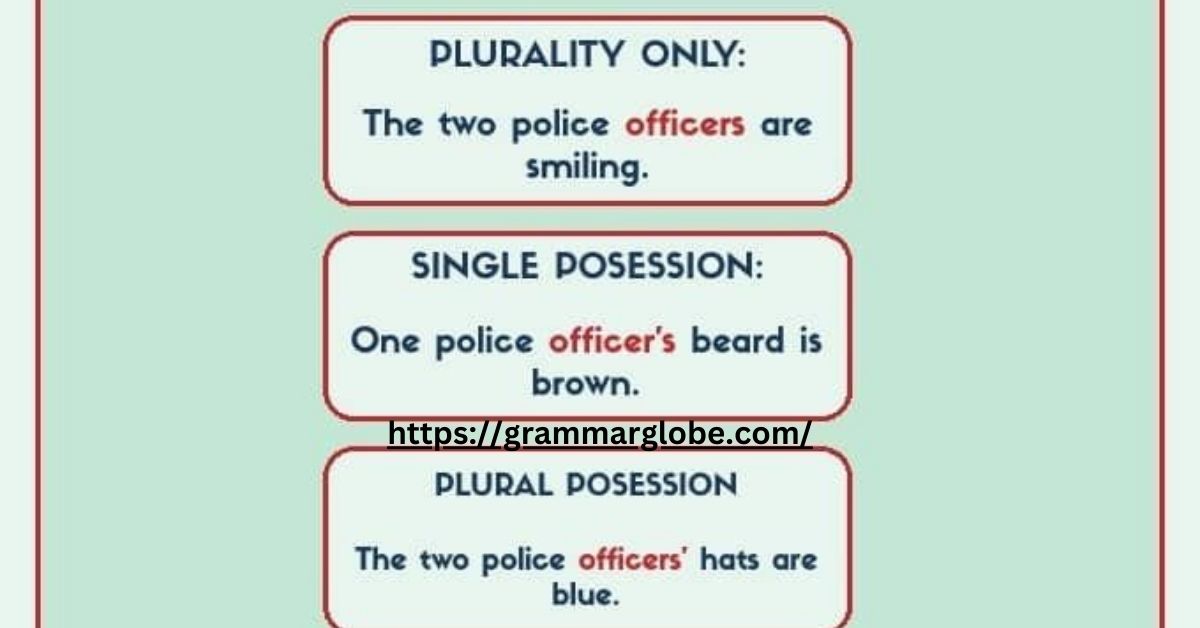
Apostrophe has been employed in some of the greatest literary works, where it deepens emotional resonance and enhances themes. Below are 10 memorable examples of apostrophe in literature:
“Julius Caesar” by William Shakespeare
- Quote: “O judgment! thou art fled to brutish beasts, And men have lost their reason.”
- Analysis Apostrophe‘s Example in Literature: Mark Antony’s appeal to abstract judgment underscores his grief and anger at Caesar’s assassination.
“Death Be Not Proud” by John Donne
- Quote: “Death, be not proud, though some have called thee Mighty and dreadful, for thou art not so.”
- Analysis Apostrophe’s Examples in Literature: Donne personifies death to diminish its power, reflecting themes of faith and mortality.
“Ode to a Nightingale” by John Keats
- Quote: “Thou wast not born for death, immortal Bird!”
- Analysis Apostrophe’s Examples in Literature: Keats’ apostrophe to the nightingale elevates it as a symbol of eternal beauty, contrasting human mortality.
“The Odyssey” by Homer
- Quote: Odysseus’s prayers to the gods and nature.
- Analysis: Apostrophe emphasizes his vulnerability and humanity amid divine forces.
“To His Coy Mistress” by Andrew Marvell
- Quote: Persuasive appeals to an unnamed lover.
- Analysis Apostrophe’s Examples in Literature: Apostrophe deepens the rhetorical impact of Marvell’s carpe diem argument.
“Ozymandias” by Percy Bysshe Shelley
- Quote: “Look on my Works, ye Mighty, and despair!”
- Analysis Apostrophe‘s Examples in Literature: The apostrophe mocks human arrogance and reflects the impermanence of power.
“Hamlet” by William Shakespeare
- Quote: “Alas, poor Yorick! I knew him, Horatio.”
- Analysis: Hamlet’s address to the skull is a meditation on mortality and the fleeting nature of life.
“O Captain! My Captain!” by Walt Whitman
- Quote: “O Captain! My Captain! our fearful trip is done.”
- Analysis: Whitman’s apostrophe mourns Abraham Lincoln as a symbolic leader.
“Frankenstein” by Mary Shelley
- Quote: Victor’s cries to fate and lost loved ones.
- Analysis: Apostrophe intensifies Victor’s anguish and guilt.
“Jane Eyre” by Charlotte Brontë
- Quote: Jane’s heartfelt plea to Mr. Rochester.
- Analysis: Apostrophe reflects Jane’s unwavering emotional bond.
How Apostrophe Enriches Literary Style
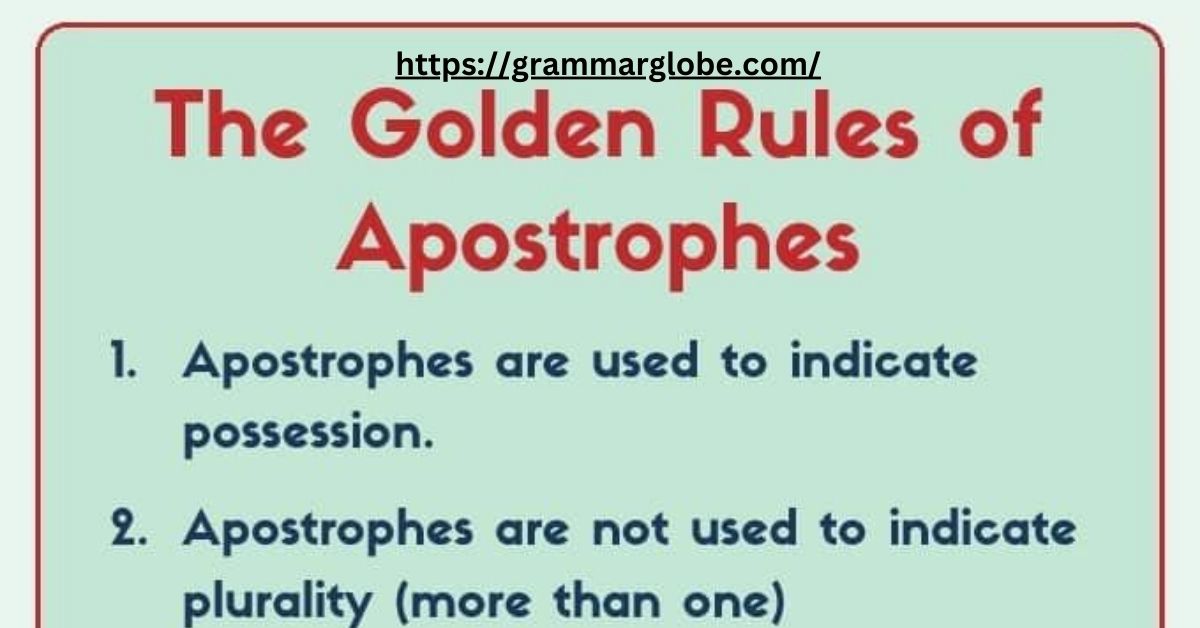
Enhancing Symbolism Apostrophe’s Examples in Literature
Apostrophe adds symbolic depth, transforming abstract themes like love or fate into tangible entities. For example:
- In “Ode to a Nightingale,” Keats’ nightingale symbolizes eternal beauty and escape.
Creating Vivid Imagery Apostrophe’s Examples in Literature
Through apostrophe, writers animate inanimate objects, offering readers a sensory experience:
- Example: “O wild West Wind, thou breath of Autumn’s being” (Shelley).
Universal Themes Apostrophe Example in Literature
Apostrophe allows authors to explore universal themes:
- Mortality: “O Death, be not proud.”
- Human Condition: Dialogues with fate or lost loved ones.
- Passage of Time: Reflections on impermanence.
Challenges of Using Apostrophe
While impactful, Apostrophe and Examples in Literature must be employed thoughtfully. Overuse can result in melodrama, alienating the audience. Writers must balance emotional expression with narrative progression.
Conclusion
The apostrophe is a powerful literary device that deepens emotional engagement and connects readers to universal human experiences. By addressing absent or abstract entities, it transcends boundaries, allowing literature to resonate across time and culture.
As Whitman beautifully said:
“O Captain! My Captain! our fearful trip is done.”
Such moments remind us why apostrophe remains an enduring hallmark of great literary works.

Johan Michel is a clever linguist at Grammar Globe, where he dives into the nuances of English grammar and wordplay. Known for his sharp humor and insightful puns, Johan’s articles make grammar lessons both fun and accessible. Explore his unique style at https://grammarglobe.com/.

